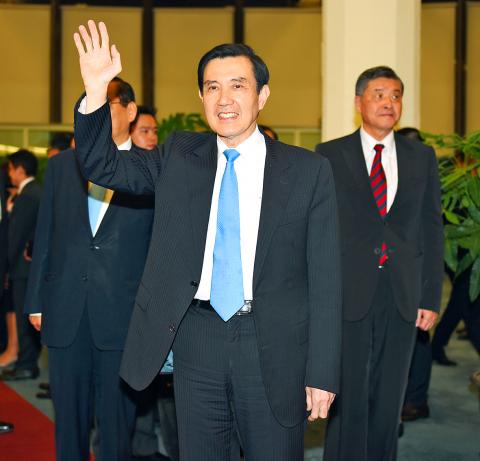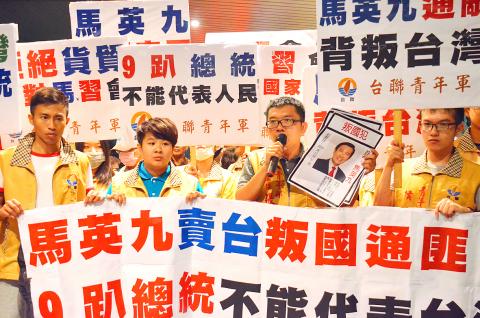In response to criticism over his meeting in Singapore with Chinese President Xi Jinping (習近平), President Ma Ying-jeou (馬英九) defended his performance while on board a flight back to Taiwan, which arrived at Taiwan Taoyuan International Airport early yesterday morning.
During the flight, Ma told reporters that the most significant result of his meeting with Xi was that leaders from the two sides of the Taiwan Strait had finally met and expressed their willingness to jointly discuss relevant issues.
“There are too many problems across the Strait that need to be dealt with. While a number of them have been resolved over the past few years, there are still many left, which is why we require a communication platform at a higher level,” Ma said, adding that the meeting was just a first step.

Photo: CNA
Asked how he felt about Xi’s response to Taiwanese concern over the threat China’s military poses to Taiwan, Ma said he was “not very satisfied” with Xi’s answer that the deployments did not target Taiwan.
“I told Xi that Taiwanese are rather concerned about the issue and hope China could make some gestures of goodwill... While I am not content with Xi’s response, at least I started the dialogue and I will bring up the matter again if given the opportunity in the future,” Ma said.
Ma added that he said everything he “was supposed to say” in front of Xi, including two mentions of the Republic of China (ROC) Constitution, as well as one mention each of the ROC and “one China, different interpretations.”

Photo: Chiu I-tung, Liberty Times
However, Xi did not make any significant reactions to his references to the ROC, Ma said, adding that he did not say “ROC president” during their meeting.
Shrugging off Democratic Progressive Party (DPP) presidential candidate Tsai Ing-wen’s (蔡英文) criticism of the meeting’s outcome, Ma said he had clearly mentioned “one China, different interpretations” and the so-called “1992 consensus” — a term former Mainland Affairs Council chairman Su Chi (蘇起) admitted making up in 2000 that refers to a tacit understanding between the Chinese Nationalist Party (KMT) and the Chinese government that both sides acknowledge there is “one China,” with each side having its own interpretation of what “China” means.
“‘One China, different interpretations’ means we can have different interpretations of the term ‘one China,’ while the ‘1992 consensus’ allows both sides to verbally state their respective interpretations of what ‘one China’ means,” Ma said.
“This is what gives us room [to maneuver]. Without this space, why would it be called the ‘1992 consensus?’” he added.
In regards to his performance at the meeting, Ma said he fulfilled nearly all of his original objectives, including bringing up the “1992 consensus”; “one China, different interpretations”; and the Constitution’s prohibition on remarks such as “two Chinas,” “one China, one Taiwan” and Taiwanese independence.
“Some have misunderstood my words as an attempt to fawn to the People’s Republic of China, but it was not. These terms are forbidden by our own Constitution,” Ma said.
Meanwhile, Premier Mao Chi-kuo (毛治國) said the Ma-Xi meeting had major historic significance, as both leaders took an important first step toward more institutionalized meetings in the future. Mao made the remarks yesterday afternoon while visiting the Taipei International Travel Fair, at which he met with travel industry representatives.
“This historic event has drawn global attention, and we, the people in Taiwan, should be united to tell the world about the importance of having peaceful cross-strait relations,” Mao said. “This is also an opportunity to let the world know about the contributions made by Taiwanese to peaceful development in the Asia-Pacific region.”
When asked if Chinese tourists would be allowed to make transit stops in Taiwan while he remains in office, Mao said that is “one of the follow-up issues that we will have to work on.”

DAREDEVIL: Honnold said it had always been a dream of his to climb Taipei 101, while a Netflix producer said the skyscraper was ‘a real icon of this country’ US climber Alex Honnold yesterday took on Taiwan’s tallest building, becoming the first person to scale Taipei 101 without a rope, harness or safety net. Hundreds of spectators gathered at the base of the 101-story skyscraper to watch Honnold, 40, embark on his daredevil feat, which was also broadcast live on Netflix. Dressed in a red T-shirt and yellow custom-made climbing shoes, Honnold swiftly moved up the southeast face of the glass and steel building. At one point, he stepped onto a platform midway up to wave down at fans and onlookers who were taking photos. People watching from inside

A Vietnamese migrant worker yesterday won NT$12 million (US$379,627) on a Lunar New Year scratch card in Kaohsiung as part of Taiwan Lottery Co’s (台灣彩券) “NT$12 Million Grand Fortune” (1200萬大吉利) game. The man was the first top-prize winner of the new game launched on Jan. 6 to mark the Lunar New Year. Three Vietnamese migrant workers visited a Taiwan Lottery shop on Xinyue Street in Kaohsiung’s Gangshan District (崗山), a store representative said. The player bought multiple tickets and, after winning nothing, held the final lottery ticket in one hand and rubbed the store’s statue of the Maitreya Buddha’s belly with the other,

‘NATO-PLUS’: ‘Our strategic partners in the Indo-Pacific are facing increasing aggression by the Chinese Communist Party,’ US Representative Rob Wittman said The US House of Representatives on Monday released its version of the Consolidated Appropriations Act, which includes US$1.15 billion to support security cooperation with Taiwan. The omnibus act, covering US$1.2 trillion of spending, allocates US$1 billion for the Taiwan Security Cooperation Initiative, as well as US$150 million for the replacement of defense articles and reimbursement of defense services provided to Taiwan. The fund allocations were based on the US National Defense Authorization Act for fiscal 2026 that was passed by the US Congress last month and authorized up to US$1 billion to the US Defense Security Cooperation Agency in support of the

‘COMMITTED TO DETERRENCE’: Washington would stand by its allies, but it can only help as much as countries help themselves, Raymond Greene said The US is committed to deterrence in the first island chain, but it should not bear the burden alone, as “freedom is not free,” American Institute in Taiwan Director Raymond Greene said in a speech at the Institute for National Defense and Security Research’s “Strengthening Resilience: Defense as the Engine of Development” seminar in Taipei yesterday. In the speech, titled “Investing Together and a Secure and Prosperous Future,” Greene highlighted the contributions of US President Donald Trump’s administration to Taiwan’s defense efforts, including the establishment of supply chains for drones and autonomous systems, offers of security assistance and the expansion of